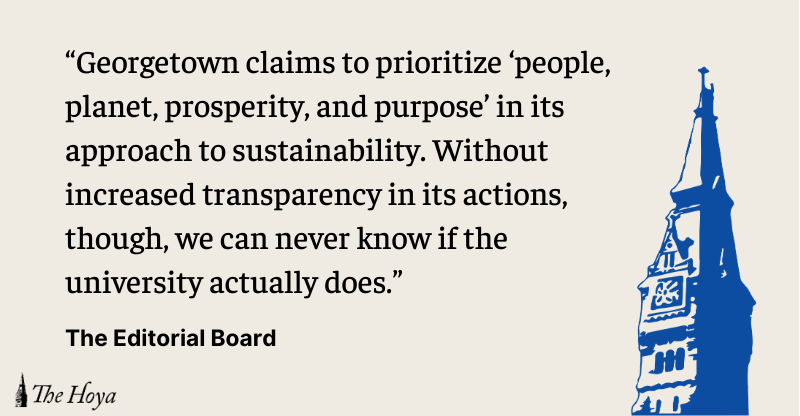March 15, 2023 — aside from being a day of Caesarian infamy — marked one year since Georgetown University administration began meetings to strategize new long-term improvements to campus sustainability.
A month after the talks, the university released a document outlining the steps that the university has taken to prioritize sustainability, promising a draft of the plan in September 2022 and the final version at some time in October or November 2022. Yet today, the website states the final release date as “late 2023.”
Georgetown’s lack of transparency on the process of creating its sustainability plans is stifling its efforts toward addressing environmental protection — something that cannot be put on hold.
Thus, the Editorial Board calls on the university to release its final sustainability plan as soon as possible. By prioritizing transparency through every stage of the planning and release process, the Georgetown community has the opportunity to actively participate in the university’s pursuit of sustainability.
A 2019 presentation prepared with advisory by Deloitte charted Georgetown’s sustainability strategy and implementation plan, setting ambitious goals for 2030 that included becoming carbon negative and water positive, as well as a Zero Waste campus. Georgetown even paints itself as becoming a “global leader on sustainability.”
Today, though, the public does not know whether Georgetown is on track to meet these goals.
In 2021, the Georgetown Renewable Energy and Environmental Network, a student-run environmental advocacy group, released an 11-page plan urging the university to create a comprehensive sustainability plan. Yet since the release of its sustainability plan framework in April of last year, the university has not shared its progress with the community.
Georgetown published a comprehensive sustainability plan for Georgetown over four years ago, and while its goals held promise, it provided no time frame for the policy’s implementation. As of March 2023, the university has yet to fully execute it.
“Specific scope and goals are still actively being discussed and will be shared more broadly when they are ready for additional input,” a university spokesperson wrote to The Hoya on behalf of the Georgetown Office of Sustainability.
This ambiguity is only one example of the larger trend of a lack of transparency from the Georgetown administration when it comes to its sustainability plans.
One particular effort that Georgetown has touted in its pursuit of sustainability is its planned divestment from fossil fuel companies. While admirable, these plans have raised transparency concerns, with students noting that Georgetown does not publicly disclose its investments, unlike many peer institutions. This makes it impossible to independently verify whether the university has followed through with its actions.
This information, however, should be publicly available — and students should be involved in discussing the plans.
Not to mention, information on Georgetown’s sustainability issues is difficult to locate on Georgetown’s website. Much of the available information is written in complex, inaccessible language geared toward bureaucratic processing rather than the university community.
Interestingly enough, any information that is publicly shared indicates that Georgetown often meets or even exceeds expectations. In 2020, Environment America, a national environmental advocacy group, ranked Georgetown as No. 1 in the country in renewable energy use and No. 7 in green power use among 127 U.S. colleges and universities.
The university also has a robust composting program, with Leo J. O’Donovan Dining Hall, the only dining hall on campus, composting both pre-consumer waste from food preparation and post-consumer waste from returned dishware, according to the spokesperson.
Without an avenue to accept input or communicate progress consistently, though, the pursuit of sustainability on this campus will never be a communal, constantly improving effort.
While there are a number of steps that Georgetown can take to keep the community informed of its progress on these initiatives, the university has rested on its laurels and ventured no further than promises.
Thus, the Editorial Board urges Georgetown to create the infrastructure for effective student-to-administration communication in order to more effectively update the community on the status of projects promoting sustainability on campus.
The university should create a regularly scheduled update system to keep students and other stakeholders informed on sustainability efforts. Georgetown could achieve this by offering a subscription-based newsletter for community members or posting regular briefings on the Georgetown Office of Sustainability’s website.
Georgetown should also offer more consistent forums for student input as it has in the past, either with a survey accessible through the Georgetown Office of Sustainability’s website and Instagram account or with regular office hours with representatives from the Georgetown Office of Sustainability.
“We each have an important role to play to create a more sustainable university, so individual action is going to be a big part of the plan,” Meghan Chapple, Georgetown’s vice president of sustainability, wrote to The Hoya.
But, if students do not even know what the plan is, then there is no way for them to be a “big part” of it.
Georgetown claims to prioritize “people, planet, prosperity, and purpose” in its approach to sustainability. Without increased transparency in its actions, though, we can never know if the university actually does.
The Hoya’s Editorial Board is composed of six students and is chaired by the opinion editors. Editorials reflect only the beliefs of a majority of the board and are not representative of The Hoya or any individual member of the board.





















Elizabeth • Mar 19, 2023 at 8:42 pm
What a great Ed!!